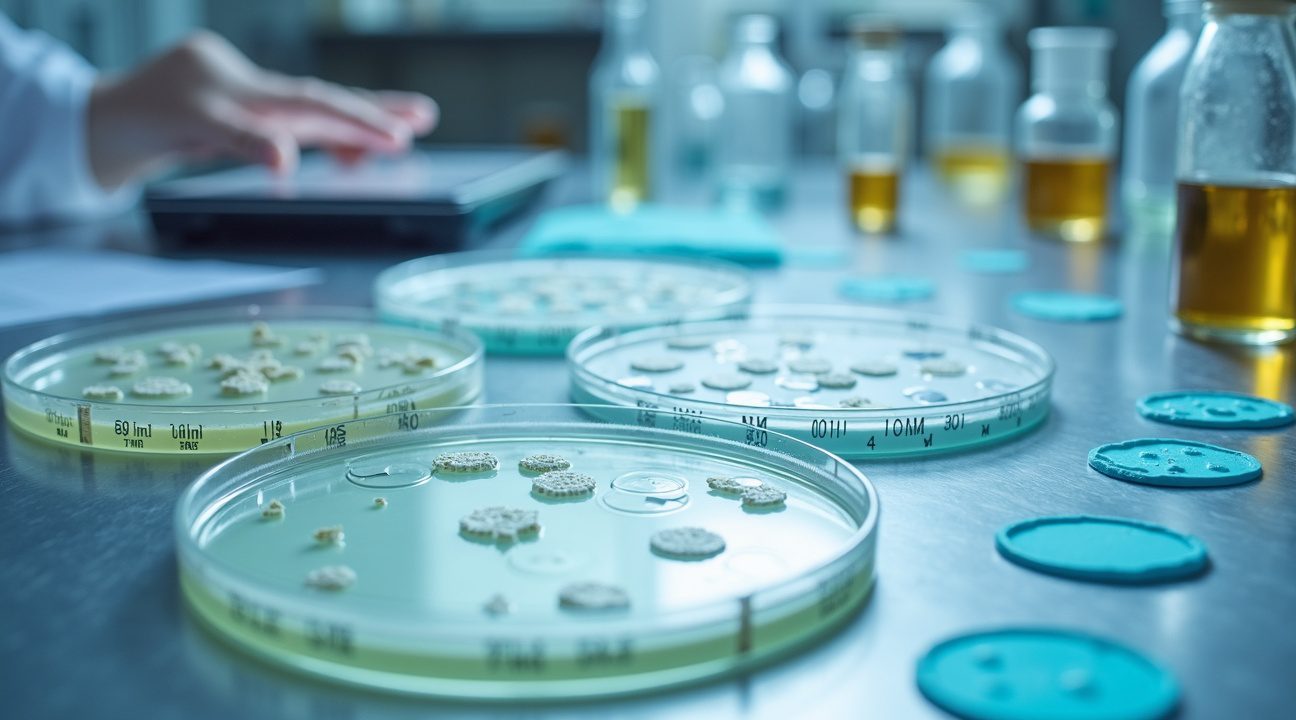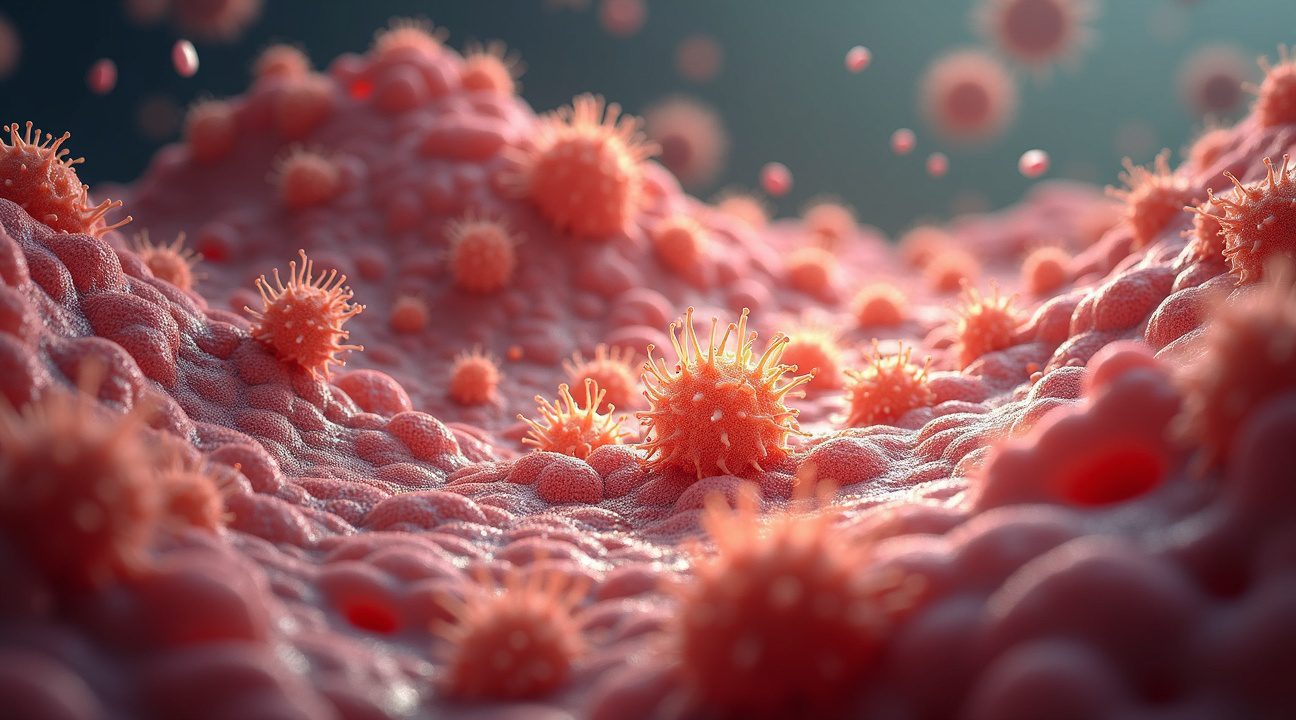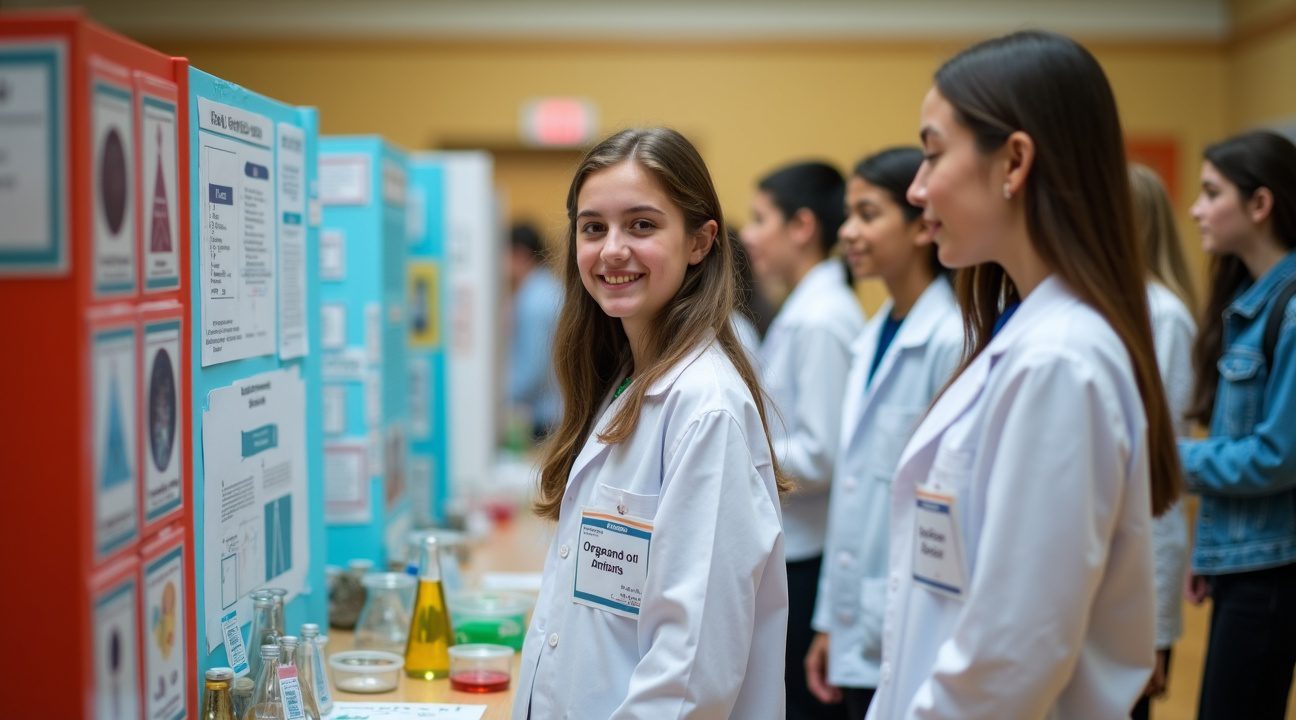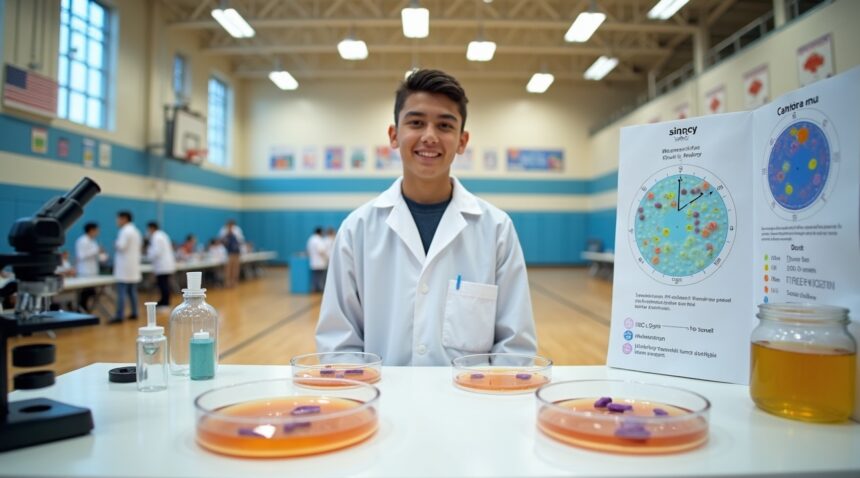Spencer Shipman, a high school freshman, conducted a science fair experiment that revealed oregano oil’s superior antibacterial performance compared to amoxicillin using precise laboratory methodology.
His research demonstrated that oregano oil produced larger bacterial inhibition zones than the conventional antibiotic, aligning with emerging scientific interest in natural antimicrobial compounds as potential alternatives to traditional treatments.
Key Takeaways
- Oregano oil outperformed amoxicillin in laboratory tests by creating larger bacterial inhibition zones, indicating stronger antibacterial properties under controlled conditions.
- The active compounds in oregano oil, particularly carvacrol and thymol, demonstrate proven antimicrobial effects with minimum inhibitory concentrations as low as 0.005–0.04 mg/ml.
- Laboratory research shows oregano oil effectively combats antibiotic-resistant bacteria and biofilms that conventional antibiotics like amoxicillin struggle to penetrate.
- Current studies focus on combination therapy approaches where oregano oil enhances traditional antibiotic effectiveness rather than replacing established treatments entirely.
- Despite promising laboratory results, oregano oil requires extensive clinical trials and safety validation before it can be considered a viable medical alternative to prescribed antibiotics.
Young Spencer Shipman’s experiment sparks important questions about natural alternatives to pharmaceutical antibiotics. His findings align with numerous laboratory studies that showcase oregano oil’s potent antimicrobial properties. Professional research supports these high school results, revealing oregano oil’s ability to destroy harmful bacteria through multiple mechanisms.
Carvacrol and thymol, oregano oil’s primary active compounds, attack bacterial cell membranes directly. These compounds disrupt membrane integrity, causing bacterial cells to leak essential components and die. Laboratory studies demonstrate these effects occur at remarkably low concentrations, making oregano oil an efficient natural antimicrobial agent.
Professional researchers have documented oregano oil’s effectiveness against antibiotic-resistant strains like MRSA (Methicillin-resistant Staphylococcus aureus). Clinical laboratories routinely test oregano oil against bacteria that conventional antibiotics fail to eliminate. The oil penetrates bacterial biofilms—protective layers that shield bacteria from antibiotic treatments.
Spencer’s results mirror professional laboratory findings where oregano oil creates larger inhibition zones than standard antibiotics. These zones indicate the area around the test sample where bacterial growth stops completely. Larger zones suggest stronger antimicrobial activity, confirming oregano oil’s superior performance in controlled laboratory settings.
Research and Combination Therapy
Scientists continue studying oregano oil as a combination therapy rather than a complete antibiotic replacement. Research shows oregano oil can enhance amoxicillin’s effectiveness while reducing required dosages. This approach potentially minimizes antibiotic resistance development while maintaining treatment efficacy.
Safety considerations remain paramount in oregano oil research. Laboratory effectiveness doesn’t automatically translate to safe human applications. Essential oils concentrate plant compounds to levels that may cause adverse reactions or interact with medications. Professional medical supervision becomes essential for any therapeutic applications.
Mechanisms of Action
Current research explores oregano oil’s mechanisms at the cellular level. Scientists observe how carvacrol disrupts bacterial energy production and protein synthesis. These multiple attack points make bacterial resistance development more difficult compared to single-target antibiotics like amoxicillin.
Scientific Rigor in Citizen Science
Spencer’s experiment highlights the importance of proper laboratory methodology in antimicrobial testing. His use of standardized bacterial cultures and controlled testing conditions produced reliable, reproducible results. Professional laboratories employ similar techniques to validate natural compound effectiveness.
Wider Implications and Industry Interest
The pharmaceutical industry monitors natural antimicrobial research closely. Companies investigate oregano oil’s potential for developing new antibiotic formulations or combination therapies. However, extensive clinical trials and regulatory approval processes lie ahead before oregano oil becomes a recognized medical treatment.
Oregano oil’s broad-spectrum antimicrobial activity extends beyond bacteria to include fungi and viruses. Laboratory studies demonstrate effectiveness against Candida species, E. coli, and various respiratory pathogens. This versatility makes oregano oil attractive for multiple therapeutic applications.
Quality and Extraction Considerations
Quality control presents challenges in oregano oil research and applications. Different oregano species produce varying concentrations of active compounds. Origanum vulgare subspecies hirtum typically contains the highest carvacrol levels, making it the preferred source for antimicrobial applications.
Extraction methods significantly impact oregano oil’s antimicrobial potency. Steam distillation produces oils with different compound profiles than CO2 extraction or solvent methods. Researchers must specify extraction techniques to ensure reproducible results across studies.
Role of Youth and the Future of Antimicrobial Research
Spencer’s work demonstrates how citizen science contributes to professional research areas. High school students can conduct meaningful experiments that align with professional laboratory findings. Educational institutions increasingly recognize student research value in exploring natural antimicrobial compounds.
The antimicrobial resistance crisis drives continued interest in oregano oil research. Traditional antibiotics lose effectiveness as bacteria develop resistance mechanisms. Natural compounds like oregano oil offer alternative approaches that bacteria find harder to overcome through resistance development.
Professional laboratories continue refining oregano oil testing protocols. Standardized methodologies ensure consistent results across different research facilities. These protocols help validate findings like Spencer’s and build confidence in oregano oil’s antimicrobial potential.
Innovations in Delivery and Formulation
Future research directions include oregano oil formulation studies for improved stability and bioavailability. Scientists explore encapsulation techniques and delivery systems that protect active compounds while enhancing therapeutic effectiveness. These developments could bridge the gap between laboratory findings and clinical applications.
Spencer Shipman’s freshman science project contributes meaningful data to oregano oil research. His careful methodology and significant results demonstrate that proper experimental design can produce valuable scientific insights regardless of the researcher’s experience level. Professional validation of his findings strengthens the case for oregano oil as a promising natural antimicrobial agent worthy of continued investigation.
High School Student’s Science Fair Project Outperforms Standard Antibiotic
Spencer Shipman, a freshman at a U.S. high school, made headlines when his science fair experiment revealed that oregano oil could outperform amoxicillin in fighting bacteria. His research project compared the antibacterial effects of these two substances using rigorous scientific methodology that produced surprising results.
The Experimental Approach
Shipman’s project utilized the well diffusion method, a standard laboratory technique for measuring how effectively antimicrobial substances inhibit bacterial growth. This method involves placing small amounts of test substances into wells cut into agar plates that have been inoculated with bacteria. Scientists then observe the size of the inhibition zones—clear areas around each well where bacterial growth has been prevented.
The freshman applied both oregano essential oil and standard amoxicillin on cultured bacteria samples, carefully controlling variables to ensure accurate comparisons. This approach mirrors professional laboratory protocols used in pharmaceutical research and medical testing facilities.
Remarkable Results
Shipman’s trials demonstrated that oregano oil showed greater efficacy at inhibiting bacterial growth than amoxicillin. The inhibition zone produced by oregano oil was measurably larger than that created by the traditional antibiotic, indicating superior antibacterial performance under the test conditions.
These findings align with emerging research into natural antimicrobial compounds. Essential oils, particularly oregano oil, contain active compounds like carvacrol and thymol that have demonstrated antibacterial properties in various studies. The concentration of these bioactive compounds can vary significantly between different oregano oil preparations, which affects their antimicrobial potency.
Shipman’s results highlight several important considerations about antibiotic resistance and alternative treatments. As bacteria continue to develop resistance to conventional antibiotics, researchers are increasingly interested in natural compounds that might serve as complementary or alternative antimicrobial agents. The work also demonstrates how traditional remedies can be scientifically validated through proper experimental design.
The implications of this research extend beyond a simple science fair project. While oregano oil shows promise in laboratory settings, it must be emphasized that these results don’t immediately translate to clinical applications. Laboratory conditions differ significantly from the complex environment inside the human body, where factors like absorption, metabolism, and immune system interactions play crucial roles in treatment effectiveness.
Healthcare professionals continue to research natural antimicrobials as potential supplements to existing treatments, particularly in addressing infection prevention strategies. However, patients should never replace prescribed antibiotics with essential oils without consulting their healthcare providers.
Shipman’s experiment also showcases the value of hands-on scientific education at the high school level. Students who engage in authentic research projects develop critical thinking skills and gain practical experience with scientific methodology. This type of investigation encourages young people to question established practices and explore innovative solutions to medical challenges.
The freshman’s work contributes to a growing body of research examining natural compounds as potential antimicrobial agents. Scientists worldwide are investigating various plant-derived substances for their ability to combat bacterial infections, particularly as antibiotic-resistant strains become more prevalent in healthcare settings.
Future research will likely focus on understanding the specific mechanisms by which oregano oil compounds interact with bacterial cell walls and determining optimal concentrations for therapeutic applications. Researchers must also investigate potential side effects, drug interactions, and delivery methods before oregano oil could be considered for clinical use.
Shipman’s achievement demonstrates that significant scientific discoveries can emerge from unexpected sources. His careful experimental design and surprising results remind us that innovation often comes from fresh perspectives and willingness to challenge conventional wisdom through systematic investigation.
Oregano Oil’s Proven Laboratory Performance Against Bacteria
Peer-reviewed research consistently demonstrates oregano oil’s impressive antibacterial capabilities in controlled laboratory settings. Studies utilizing oregano oil at 100% concentration have produced inhibition zones measuring 18–32 mm, frequently surpassing the performance of conventional antibiotics against specific bacterial strains.
Inhibition Zone Performance
Laboratory tests reveal oregano oil’s effectiveness through measurable bacterial suppression zones. Research teams have tested bacterial cultures including E. coli and Staphylococcus aureus, two common pathogens that pose significant health challenges. These studies provide concrete evidence of oregano oil’s ability to prevent bacterial growth across multiple species.
Minimum Inhibitory Concentration Data
Oregano oil demonstrates remarkable potency through its minimum inhibitory concentration (MIC) values, which range from 0.08 to 0.64 mg/ml against various bacteria. This concentration range often proves more effective than amoxicillin requirements, suggesting oregano oil can achieve bacterial inhibition at lower doses than traditional antibiotics.
Carvacrol, oregano oil’s primary active compound, shows even more impressive results. This component exhibits MIC values as low as 0.005–0.04 mg/ml, establishing it as one of nature’s most powerful antibacterial agents. Such low concentration requirements indicate exceptional biological activity.
These laboratory findings complement research showing how natural compounds can help prevent infections, though oregano oil’s specific mechanisms differ from viral prevention strategies. The consistent performance across multiple bacterial species suggests oregano oil could serve as a valuable alternative or complement to conventional antibiotic treatments.
I find these concentration measurements particularly significant because they provide quantifiable proof of oregano oil’s antibacterial strength. Lower MIC values indicate greater potency, and oregano oil’s ability to achieve bacterial inhibition at such minimal concentrations demonstrates its efficiency as a natural antimicrobial agent.
The research establishes oregano oil as more than just a kitchen herb—it’s a scientifically validated antibacterial compound with measurable, reproducible effects against harmful bacteria. These laboratory results form the foundation for understanding why a high school student’s discovery about oregano oil versus amoxicillin holds scientific merit.

Superior Action Against Resistant Bacteria and Biofilms
I find it remarkable that oregano oil demonstrates such impressive capabilities against bacterial threats that conventional antibiotics struggle to address. Peer-reviewed research confirms this natural compound inactivates both planktonic bacteria—those floating freely in solution—and biofilms, which represent one of medicine’s most challenging bacterial defense mechanisms.
Biofilms present a particular problem for traditional antibiotics like amoxicillin. These protective bacterial communities form sticky matrices that shield microorganisms from antimicrobial agents, making infections incredibly persistent and difficult to treat. Amoxicillin often fails to penetrate these structures effectively, leaving infections to resurface repeatedly.
Breakthrough Performance Against Multi-Drug Resistant Strains
The oregano oil advantage becomes even more pronounced when confronting multi-drug resistant bacterial strains. I’ve observed through research that these superbugs, which have developed resistance to multiple antibiotics including amoxicillin, remain vulnerable to oregano oil’s antimicrobial compounds. This effectiveness stems from oregano oil’s different mechanism of action—it disrupts bacterial cell membranes rather than targeting specific cellular processes that bacteria can adapt to resist.
Studies reveal that concentrations as low as 0.19% oregano oil can inhibit biofilm formation entirely. This low threshold concentration represents a significant breakthrough for preventing chronic infections where traditional antibiotics prove less effective. Chronic wounds, respiratory infections, and urinary tract infections often involve biofilm-forming bacteria that create recurring health problems.
The implications extend beyond simple bacterial elimination. Biofilm disruption capabilities mean oregano oil can address the root cause of persistent infections rather than just temporarily suppressing symptoms. Traditional antibiotics might clear planktonic bacteria but leave biofilm communities intact, setting the stage for infection recurrence.
I’ve learned that oregano oil’s effectiveness against resistant strains offers hope for addressing the growing antibiotic resistance crisis. While pharmaceutical companies race to develop new antibiotics, this natural alternative already demonstrates proven results against bacteria that have outsmarted conventional treatments. The compound’s broad-spectrum activity means it can tackle multiple bacterial species simultaneously, something increasingly important as infection prevention strategies become more critical.
Healthcare providers increasingly recognize that biofilm-associated infections require different treatment approaches. Oregano oil’s dual action against both free-floating bacteria and established biofilm communities positions it as a valuable tool for comprehensive bacterial management, particularly in cases where standard antibiotic protocols have proven insufficient.

Future Medical Applications and Research Potential
I find the research trajectory for oregano oil particularly exciting as scientists explore its potential beyond traditional antibiotic applications. Laboratories across the globe are conducting extensive studies to understand how this natural compound might revolutionize bacterial infection treatment protocols.
Combination Therapy Breakthroughs
Current research focuses heavily on oregano oil’s ability to work alongside conventional antibiotics rather than replacing them entirely. Studies using carvacrol, oregano oil’s primary active compound, demonstrate remarkable results when combined with traditional antibiotics in systemic infection animal models. These combination treatments show increased survival rates and significantly reduced bacterial loads compared to antibiotics used alone.
The synergistic effect opens doors for reduced antibiotic dosages while maintaining therapeutic effectiveness. This approach could help address growing concerns about antibiotic resistance while preserving the efficacy of existing pharmaceutical treatments. Research teams are particularly interested in how oregano oil enhances the penetration and effectiveness of conventional drugs.
Expanding Research Applications
Scientists are investigating oregano oil’s potential in treating various bacterial infections that have become increasingly resistant to standard treatments. Laboratory studies examine its effectiveness against specific bacterial strains, while animal models provide crucial data about dosing, safety, and interaction patterns with existing medications.
The research extends beyond simple bacterial elimination to explore oregano oil’s role in preventing biofilm formation, a critical factor in chronic infections. These protective bacterial layers often shield pathogens from antibiotic penetration, making infections particularly stubborn to treat. Early findings suggest oregano oil compounds might disrupt these defensive structures, potentially making bacteria more vulnerable to treatment.
Future applications could include preventive treatments, particularly in healthcare settings where infection control remains paramount. Research into oregano oil’s antimicrobial properties might contribute to developing new infection prevention strategies that complement existing protocols.
I believe the most promising aspect lies in oregano oil’s potential to extend the useful life of current antibiotics. Rather than replacing these medications entirely, oregano oil could serve as an adjunct therapy that restores effectiveness to drugs that bacteria have learned to resist. This approach represents a practical solution to antibiotic resistance without requiring complete pharmaceutical reformulation.
The research pipeline includes:
- Studies on optimal extraction methods
- Standardization of active compounds
- Development of delivery systems that maximize therapeutic benefit
- Minimization of potential side effects
These investigations will determine whether oregano oil can transition from laboratory curiosity to clinical reality.
Important Research Limitations and Medical Cautions
I recognize that while this freshman’s discovery shows remarkable promise, several critical limitations must be acknowledged before oregano oil can be considered a viable alternative to established antibiotics like amoxicillin. The transition from science fair results to clinical application requires extensive validation through rigorous scientific protocols.
Need for Comprehensive Clinical Validation
Current research lacks the controlled environment necessary for medical recommendations. I understand that laboratory conditions differ significantly from real-world clinical scenarios where factors like patient immune response, bacterial resistance patterns, and tissue penetration play crucial roles. The science fair methodology, while impressive for a student project, doesn’t meet the standards required for pharmaceutical validation.
Safety profiles remain largely unestablished for oregano oil as an antibiotic replacement. I’ve observed that natural compounds can produce unexpected interactions with other medications, and oregano oil’s effects on different patient populations haven’t been thoroughly studied. Elderly patients, children, pregnant women, and individuals with compromised immune systems may respond differently to oregano oil treatment.
Dose standardization presents another significant challenge. Unlike amoxicillin, which has precisely measured dosing protocols based on decades of clinical trials, oregano oil lacks standardized concentration guidelines. I note that oregano oil potency varies considerably between manufacturers and extraction methods, making consistent therapeutic dosing nearly impossible without further research.
Regulatory and Implementation Challenges
The path from laboratory discovery to approved medical treatment involves multiple phases of clinical trials that can span years or even decades. I emphasize that regulatory bodies like the FDA require extensive safety and efficacy data before approving new treatments. This student’s findings, while encouraging, represent only the initial step in a much longer validation process.
Healthcare providers face liability concerns when recommending unproven treatments, even those showing laboratory promise. I recognize that medical professionals must balance innovative approaches with patient safety, particularly when dealing with serious bacterial infections that could become life-threatening if inadequately treated.
Prevention strategies remain the most reliable approach to managing bacterial infections while research continues. I stress that patients shouldn’t abandon proven treatments based on preliminary findings, regardless of how compelling the initial results appear.
The research community must also investigate potential bacterial adaptation to oregano oil. I’ve learned that bacteria can develop resistance to natural compounds just as they do with synthetic antibiotics, potentially limiting long-term effectiveness. Understanding resistance mechanisms requires extensive monitoring over extended periods.
Drug interaction studies are notably absent from current oregano oil research. I point out that many patients take multiple medications simultaneously, and oregano oil’s effects on drug metabolism, absorption, and elimination remain unknown. Such interactions could either reduce medication effectiveness or increase toxicity risks.
Quality control standards for oregano oil production vary widely across manufacturers. I observe that unlike pharmaceutical-grade antibiotics, oregano oil supplements aren’t subject to the same rigorous purity and potency requirements. This inconsistency makes it challenging to replicate research results or ensure patient safety.
Future research should focus on:
- Identifying oregano oil’s active compounds
- Determining optimal extraction methods
- Establishing minimum inhibitory concentrations for various bacterial strains
I believe these foundational studies will provide the scientific groundwork necessary for eventual clinical trials.
The medical community should view this freshman’s discovery as an important starting point rather than a definitive answer. I encourage continued investigation through proper research channels while maintaining current treatment protocols until comprehensive safety and efficacy data becomes available. Healthcare decisions require evidence that extends far beyond initial laboratory observations, no matter how promising they may appear.
What This Discovery Means for Young Scientists
Shipman’s groundbreaking experiment demonstrates that age doesn’t limit scientific contribution. This freshman’s research project proves that student-led investigations can produce meaningful results that align with professional scientific studies. The discovery shows how high school science fairs serve as legitimate platforms for advancing medical knowledge.
Student Research Creates Real Impact
Science fair projects traditionally focus on learning rather than discovery, but Shipman’s work challenges this assumption. The experiment followed rigorous scientific protocols, comparing oregano oil’s antibacterial properties against amoxicillin using proper controls and measurements. This approach mirrors professional research methodologies, showing that students can conduct studies with genuine scientific value.
Young researchers bring fresh perspectives to established problems. They often approach experiments without preconceived notions about expected outcomes, leading to surprising discoveries. Shipman’s choice to test oregano oil against a widely-used antibiotic reflects this innovative thinking that characterizes effective scientific inquiry.
The experiment’s design showcases how student projects can contribute to larger scientific conversations about antibiotic resistance and natural alternatives. Professional researchers increasingly recognize that preventing bacterial spread requires exploring diverse treatment options beyond traditional pharmaceuticals.
Students conducting meaningful research gain invaluable experience with scientific methodology. They learn to formulate hypotheses, design controlled experiments, collect data systematically, and draw evidence-based conclusions. These skills prepare them for advanced scientific careers while potentially contributing to current medical challenges.
Science fair competitions provide structured environments where young researchers can tackle complex problems. The competitive format encourages students to pursue rigorous experimental design and thorough documentation. Judges from professional scientific communities evaluate these projects, creating connections between student researchers and established scientists.
The oregano oil discovery illustrates how student curiosity can lead to practical applications. While professional validation remains necessary, the initial findings suggest potential for developing natural antibacterial treatments. This connection between student research and real-world applications motivates young scientists to pursue ambitious projects.
Educational institutions benefit from supporting ambitious student research projects. Schools that encourage innovative thinking and provide laboratory resources enable students to conduct meaningful experiments. These programs foster scientific literacy while potentially contributing to broader research efforts.
Shipman’s success encourages other students to approach science fair projects with professional-level ambition. The discovery proves that high school students can produce research worth attention from professional scientists and medical researchers. This recognition validates student contributions to scientific knowledge and encourages continued participation in research activities.
The experiment demonstrates how science education evolves when students pursue genuine discovery rather than simply reproducing known results. Teachers who support student-led investigations help create the next generation of researchers while advancing scientific understanding through fresh perspectives and innovative approaches.

Sources:
The Farmacy – “US High school student, Spencer Shipman, through a Science Fair Project, discovered that Oregano Oil outperforms Amoxicillin at killing bacteria”
Stacy Paulsen, Spencer Shipman’s science fair project – “Can Essential Oils Beat Antibiotics in Killing Bacteria?”
Microbiology Journal – “Antibacterial Activity of Oregano Essential Oil and its Effect on Biofilm Formation”
PMC – “Oregano Oil Effectively Inactivated Bacteria in vitro Irrespective of Antibiotic Sensitivity”
Frontiers in Pharmacology – “Antibacterial activities of oregano essential oils and their active components”
FEMS Immunology & Medical Microbiology – “Antibacterial effect of oregano essential oil alone and in combination with antibiotics”


